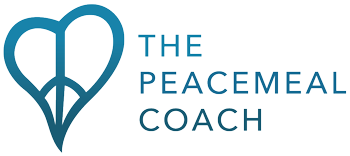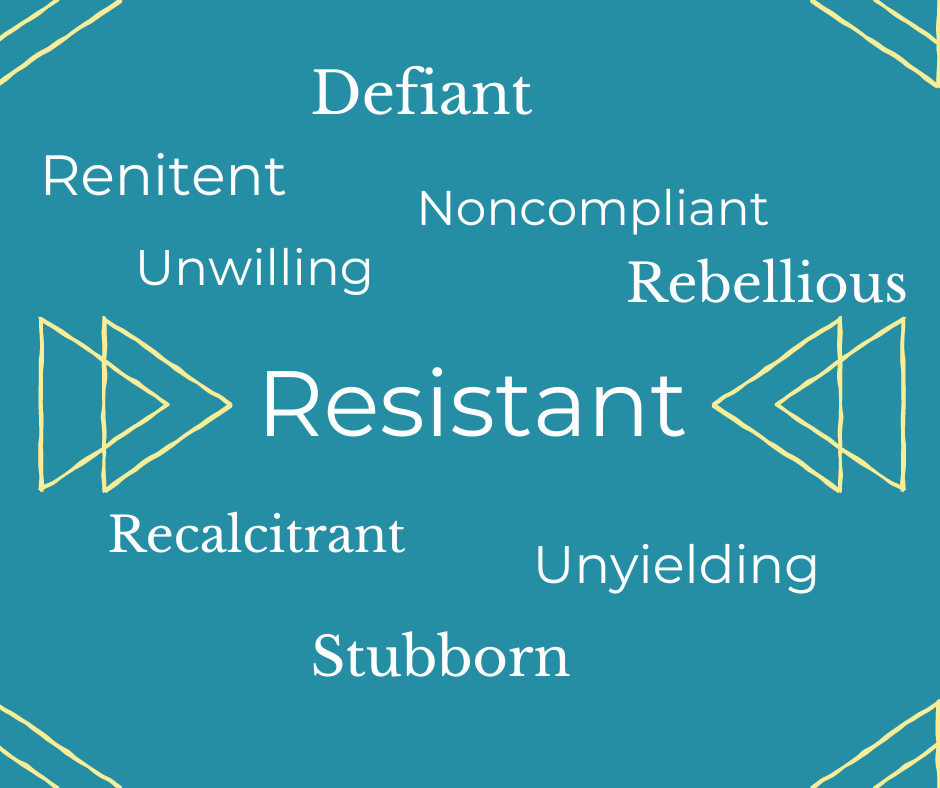When we parent a child with an eating disorder, resistance is something we become more familiar with than we ever imagined. We may even begin to see our child as resistant. Resistant to eating. Resistant to resting. Resistant to gaining weight. Resistant to treatment. Somewhere along the way, we learn that it is the eating disorder that is resistant. The eating disorder is stubborn. Renitent. Defiant. Unwilling. Rebellious. Noncompliant. Unyielding. Recalcitrant. It’s bad enough that when we attempt to do what we need to do to combat our loved one’s eating disorder that we are met with this fierce resistance. But, if you’re like me, you also have to contend with your own resistance.
When does resistance show up?
When we have a strong fear about something, resistance shows up as a way to distract us from that fear. In the context of an eating disorder, it makes sense that your loved one has a strong fear of being fat, so they are resistant to eating and gaining weight. But, what about our resistance as parents? In the context of parenting a child with an ED, it makes sense that we have strong fears about losing our loved one, causing our child distress, and maintaining a close and loving relationship, so we are resistant to doing many of the things that are required of caregivers.
What does resistance look like?
Our resistance can show up as a parent looking for answers outside the eating disorder diagnosis. For example, it can look like getting a GI workup to rule out GI issues before getting ED treatment. It can show up as procrastinating on making treatment decisions. Resistance can look like negotiating with the ED instead of requiring your loved one to eat their meal. It can be holding onto the status quo instead of making changes. For example, resistance can show up as allowing them to go to college without a contract in place to maintain recovery. Resistance can look like allowing your loved one to return to a sport without adequate weight restoration. Resistance can show up as being stuck in confusion and not moving forward or being constantly overwhelmed and unwilling to do what the ED experts recommend. Resistance can look like wallowing in how bad everything is and how bad you are at doing what needs to be done.
I didn’t see it clearly at the time, but my resistance was an indicator of my fears.
I had a fear that my daughter wasn’t going to be okay. I had a fear that if I did the things I was supposed to do, I would cause her distress and that distress would cause me to lose my relationship with her. For a time, my resistance showed up in ways that were not helpful for me or for my daughter:
I was resistant to the reality of her eating disorder.
I was resistant to making treatment decisions.
I was resistant to treatment.
I was resistant to the extra weight she needed to gain above what I thought her target should be.
I was resistant to the amount of food I needed to make sure she ate every day.
I was resistant to her resistance.
I was resistant to using leverage.
I was resistant to her missing school until she was medically stable.
I was resistant to accepting that she may have a different trajectory than expected.
I was resistant to acknowledging the deep impact her eating disorder had on her, her siblings, her dad, and myself.
I was resistant to the truth of setbacks.
I was resistant to accepting how much my life changed because of her eating disorder.
I was resistant to her quitting ballet.
I was resistant to changing my own exercise and eating habits.
I was resistant to getting help for myself.
I was resistant to taking care of myself.
Yes, I had a lot of resistance, and I’m grateful that I learned how to work with my resistance so that I could be the mom I wanted to be for my daughter.
Working with my own resistance helped me manage her resistance.
So, what can I do if I recognize my resistance?
First and foremost, acknowledge that resistance is completely normal for all of us, but especially for those of us who are caring for a loved one with an ED. Becoming aware of your resistance is important because it will open up the possibility to shift the way you are showing up. The energy you bring to every interaction with your child will set the tone. When you come to a meal with confidence in yourself as a parent, you communicate to your child that they can have confidence in you. When you come to a meal with a calm demeanor, your child will sense that they can count on you to love them and support them.
Resistance is normal. Resistance is an indicator of fear, and fear is a natural response when we are facing a life-threatening illness in someone we love. If resistance arises for you, nothing has gone wrong. Instead of trying to avoid the resistance, suppress the resistance, judge the resistance, or fight the resistance, use curiosity to explore your resistance.
How do we approach our own resistance?
We approach our own resistance the same way we would our loved one’s resistance to eating and weight gain–with compassion and love. Consider leaning into what you are resisting. When you lean into your resistance, it isn’t going to feel natural. It will take some practice. Keep leaning in, keep showing up with the energy you want to have to be the parent you want to be. Celebrate the small victories.
Try working with your resistance:
What does your heart want the resistance to know?
How can you act from feelings of love and compassion when you feel the resistance come up?
It helps to know that resistance in the face of fear is very normal. I’ve learned that my resistance is understandable, and that it isn’t a realistic goal to try to get rid of it or to prevent it from coming up. My resistance is serving a purpose. It is there to distract me from my underlying fears. When I approach my resistance with compassion, I’m able to show up with love for my daughter which helps her with her resistance.
Now, when I feel that familiar sense of resistance come up, I remind myself that resistance is normal, and it’s something I can work on.
If you’d like some help navigating your resistance as you care for a loved one with an eating disorder, please email me at jenni@peacemealcoach.com to schedule a free consultation. I would love to help you track your resistance, identify your resistance archetype, and strategize with you to reach your goals.






